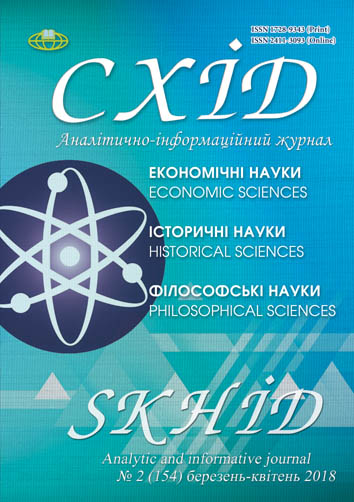Comparative ideal-conceptological analysis of social-philosophical approach to social aspects of mercy
DOI:
https://doi.org/10.21847/1728-9343.2018.2(154).132994Keywords:
mercy, evolutionism, pragmatism, utilitarianism, law of mutual assistance, liberalismAbstract
The article is devoted to the comparative ideological and conceptual analysis of the socio-philosophical approach to the social aspects of mercy. The phenomenon of mercy is studied by the author through the prism of a variety of Western social and ethical teachings (evolutionism, utilitarianism, hedonism, liberalism, neo-Marxism and post-Marxism). In the context of evolutionism, mercy receives the significance of altruism. Particular attention is paid to the concept of mutual assistance by P. Kropotkin. In utilitarianism mercy is viewed through the prism of individual and social benefit. In turn, in the context of liberalism, mercy loses its social value, since the focus is on a free personality with its own moral choices. The author analyzes the concept of rational selfishness in a separate way by A. Rand. Through the prism of social and applied research of neo-Marxism and post-Marxism mercy appears as a factor in the subject's activity in relation to its environment and its subsequent influence on the development of society. The ideological and conceptual analysis of the socio-philosophical approach to the social aspects of mercy through the prism of Western philosophical thought (evolutionism, hedonism, utilitarianism, liberalism) allowed us to determine that today mercy in the context of social practice receives a pragmatic orientation, which is associated with such factors as benefits, mutual assistance. In turn, the ideals of self-sacrifice and altruism are embodied in the context of the aspirations of the individual, but are no longer a "social" ethical imperative. All this puts mercy as a powerful integrative factor of society in a rather shaky situation. To a certain extent, the situation is "rehabilitated" due to modern socio-philosophical research of neo-Marxism and post-Marxism, where mercy should be considered as the basis for active complicity of the subject and object, the factor of the formation of civil associations for the implementation of social transformations.
Downloads
References
Bennett, C., 2004. The Limits of Mercy. Ratio. Vol. 17, Issue 1, pp. 1-11 DOI: 10.1111/j.1467-9329.2004.00232.x.
Meyer, L.R., 2010. The Justice of Mercy. Ann Arbor: The University of Michigan Press, 264 p. DOI: 10.3998/mpub.328658.
Murphy, J.G., Hampton, J., 1988. Forgiveness and Mercy. Cambridge: Cambridge University Press, 194 p. DOI: 10.1017/cbo9780511625121.
Kesselring, K.J., 2003. Mercy and Authority in the Tudor State. Cambridge: Cambridge University Press, 242 p. DOI: 10.1017/cbo9780511495854.
Apresian, R.G., 1995. The idea of morality and basic normative and ethical programs. Moscow, 353 p. (rus)
Spencer, H., 1997. Synthetic philosophy. Kyiv: Nika-Centr, 512 p. (rus)
Efroimson, V.P., 1995. Genetics of Ethics and Esthetics. St. Peterburg: Talisman, 288 p. (rus)
Logunova, E.H., 2012. To the question of two concepts of the phenomenon of mercy. Discussion, 3, pp. 21-24. (rus)
Kropotkin, P.A., 2011. Mutual assistance among animals and humans as the engine of progress. Moscow: Librokom. (rus)
Sushentsova, M.S., 2017. Utilitarianism of I. Bentham and J.S. Mill: from virtue to rationality. Bulletin of St. Petersburg State University. Economy, Vol. 33, Issue 1, pp. 17-35. (rus)
Serebrianskiy, D.S., 2011. Classical utilitarianism: the main theoretical problems. Ethical thought, Issue 11, pp. 90-104. (rus)
Gaydenko, P.P., 2000. The moral nature of man in the European tradition of the XIX-XX centuries. Ethical thought, pp. 88-106. (rus)
Burmistrov, S.L., 2011. Anthropology of American pragmatism. Human, 4, pp. 104-115. (rus)
Yarkova, E.N., 2004. Utilitarianism as a moral basis for the modernization of culture and society (based on the Western ethical and philosophical tradition). Europe, 4, pp. 159-180. (rus)
Nikiforov, A.L., 2016. The Individual of Liberalism and its Moral. Personality. Culture. Society, V. 18, Issue 1-2, pp. 161-177. (rus)
Denisov, A.A., 2006. Principles of moral regulation of society in liberal and traditional ethics. Omsk scientific Bulletin, 2, pp. 35-41. (rus)
Vissenburg, M., 2010. Liberalism and nature. Political science, 2, pp. 88-108. (rus)
Rand, A. Objective Ethics. In The Apology of Capitalism. Available at: http://www.urantia-s.com/library/rand/apologiya_kapitalizma/full
Kurenykh, K.A., 2017. The treatment of rational egoism in ethics of A. Rand. Social life and power, 4, pp. 122-126. DOI: 10.22394/1996-0522-2017-4-122-126.
Downloads
Published
How to Cite
Issue
Section
License
Copyright (c) 2018 Yuriy Khodanych

This work is licensed under a Creative Commons Attribution-NonCommercial-NoDerivatives 4.0 International License.
1. Authors bear responsibility for the accuracy of facts, quotations, numbers and names used.
2. Manuscripts are not sent back.
3. The publisher does not always agree with the authors' opinion.
4. The authors reserve the right to authorship of the work and pass the first publication right of this work to the journal under the terms of a Creative Commons Attribution-NonCommercial-NoDerivatives 4.0 International License. This license allows others to distribute (copy) the published work for non-commercial purposes, provided there is mandatory attribution to its authors and a link to the first publication in our journal.
5. The authors have the right to conclude separate supplement agreements that relate to non-exclusive work distribution in the form in which it has been published by the journal (for example, to upload the work to the online storage of the journal or publish it as part of a monograph), provided that the reference to the first publication of the work in this journal is included.

